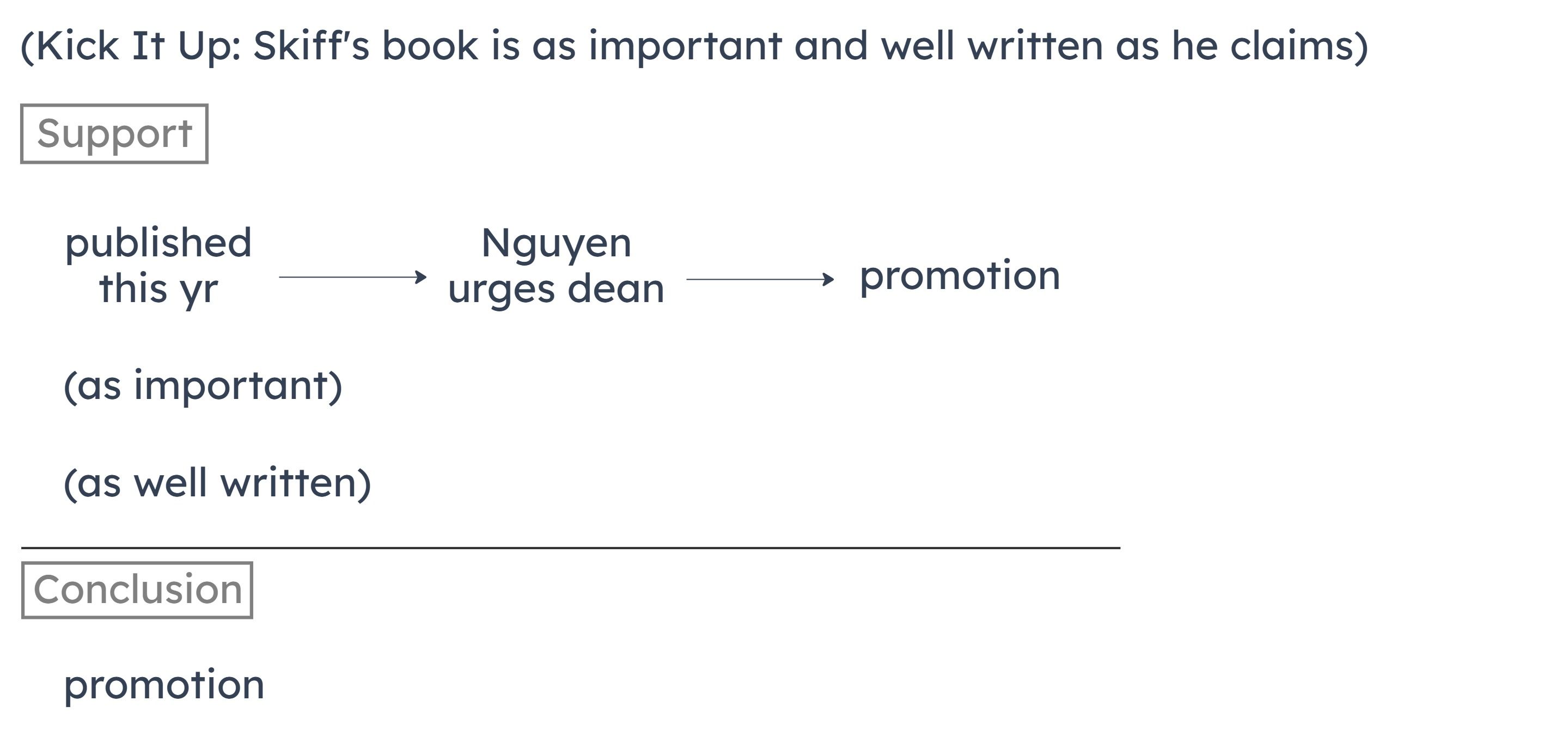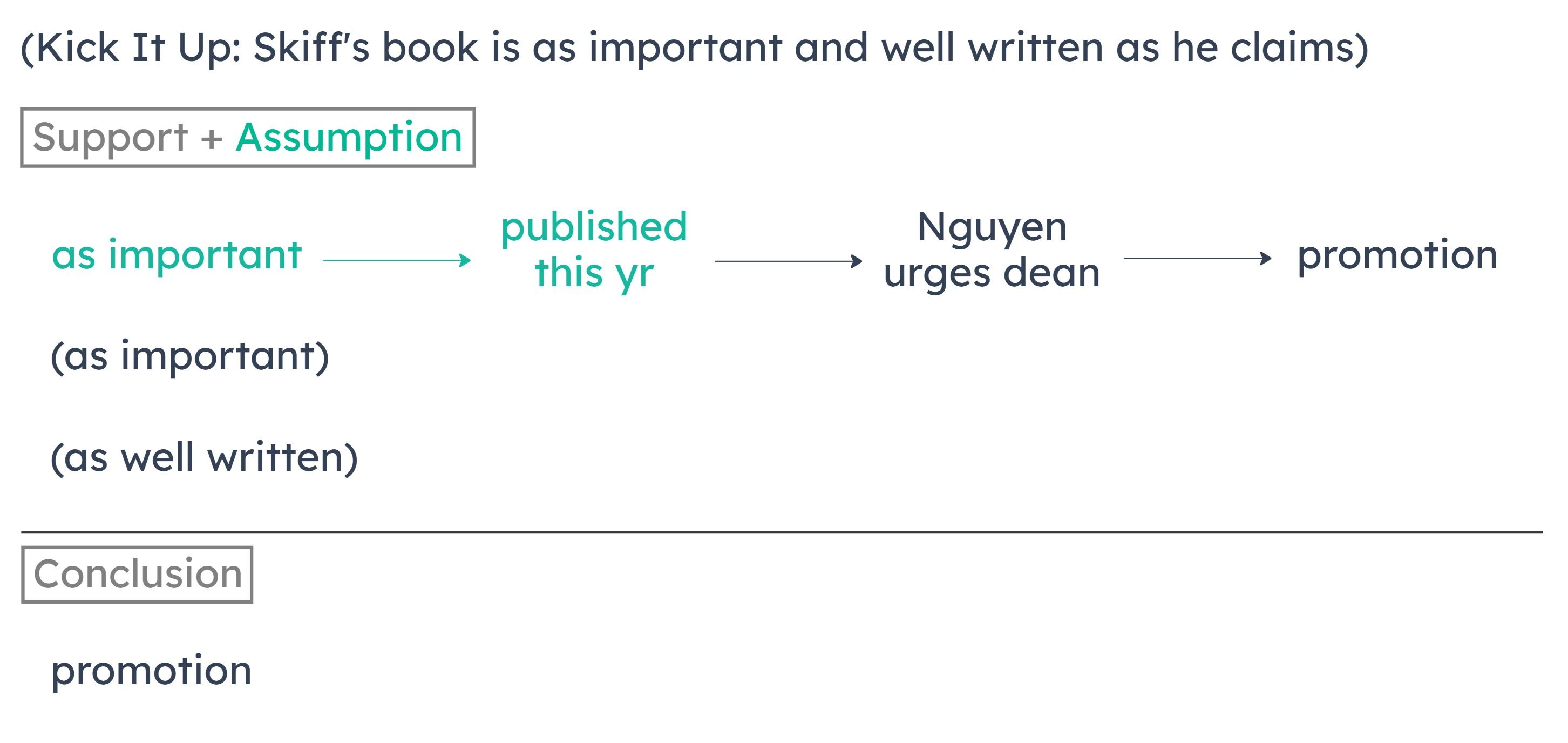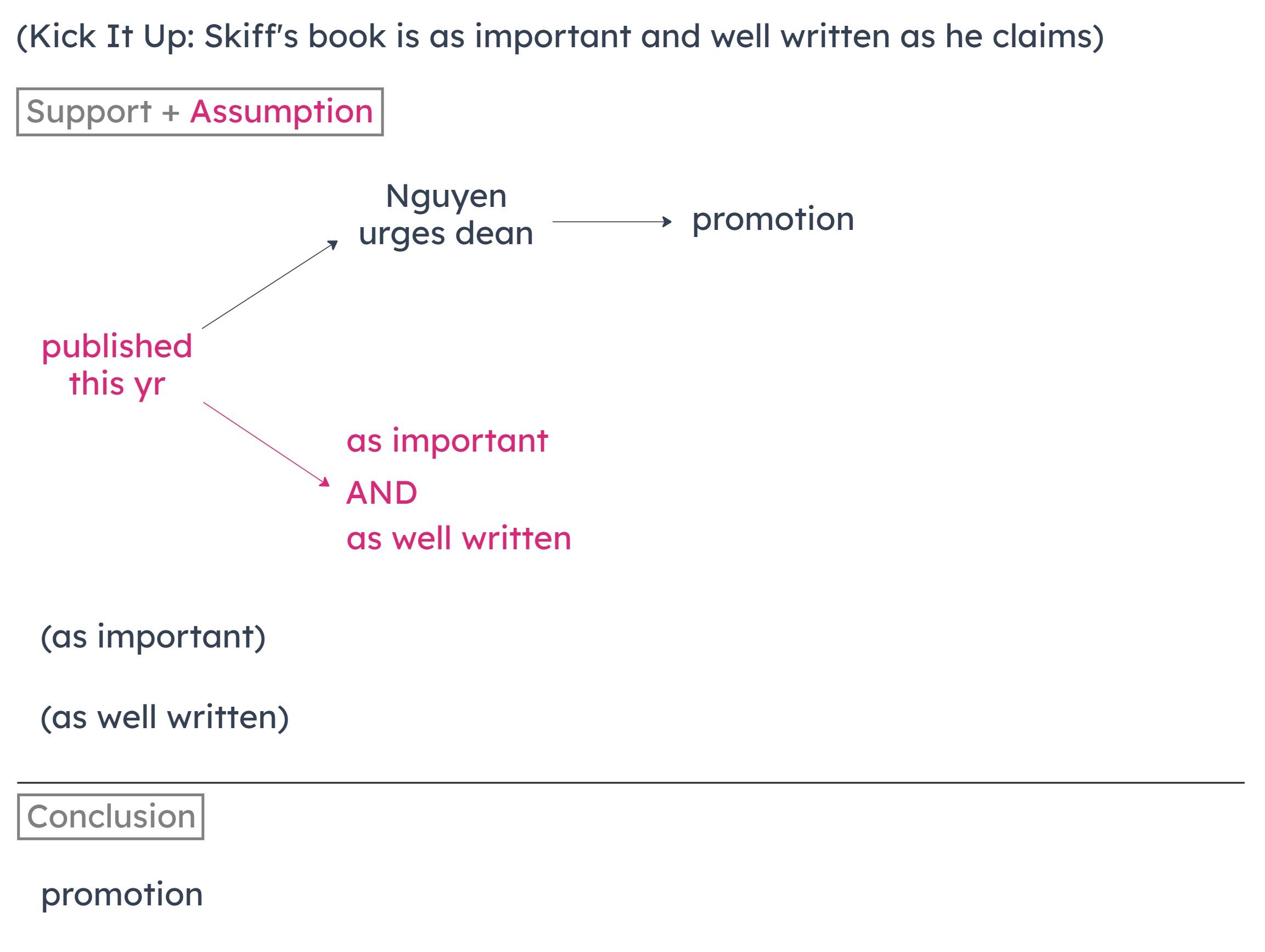That year, the tropics were susceptible to fire because of a drought caused by an unusually strong El Nino.
Many scientists think the strength of El Nino that year was enhanced by global warming caused by air pollution.
Note that we cannot infer that the El Nino was unusually strong because of global warming from air pollution. We’re told that many scientists “believe” that this is the case, but this doesn’t establish that this belief is true.
A
Air pollution was largely responsible for the size and intensity of the forest fires that swept the tropics in 1997.
B
If the El Niño in 1997 had not been unusually strong, few if any large and intense forest fires would have swept the tropics in that year.
C
Forest fires in the tropics are generally larger and more intense than usual during a strong El Niño.
D
At least some scientists believe that air pollution was responsible for the size and intensity of the forest fires that swept the tropics in 1997.
E
If air pollution enhanced the strength of the El Niño in 1997, then it also contributed to the widespread drought in that year.
This question is very hard. It's hard because the information is presented to you in a mess, kind of like how Logic Games present information to you. I cleaned up the information a bit, starting from the first cause going through to the last effect. The LSAT writers, in their never ending quest to torment, presented the information backwards, of course.
Many scientists believe that air pollution causes global warming.
Many scientists believe that global warming enhanced the strength of the El Niño.
In 1997, an unusually strong El Niño caused widespread drought.
In 1997, widespread drought caused the tropics to be susceptible to fire.
In 1997, unusually large and intense forest fires swept the tropics.
+++++++++++++++++++++
Let's consider each answer choice.
(A) Air pollution was largely responsible for the size and intensity of the forest fires that swept the tropics in 1997. Really? Come on. We don't even know if air pollution was even the slightest bit responsible, not to mention "largely" responsible. The link between air pollution and El Niño owes to what "many scientists believe." Those scientists could just be wrong.
(B) If the El Niño in 1997 had not been unusually strong, few if any large and intense forest fires would have swept the tropics in that year. I will not yell at you as loudly if you chose this answer choice. This one is tempting. We know that the strong El Niño was a causal component that contributed to the usually large and intense forest fires. But, that doesn't mean that if it wasn't present, the fires wouldn't have happened anyway. Who's to say what would have happened if the El Niño wasn't unusually strong? Maybe volcanos would have erupted setting the forests ablaze. Maybe a pyromanic on a scale never before known to the world would have run rampant through the forests of the tropics. Counterfactuals are notoriously speculative. So, MAYBE this will pass as a MSS answer choice, but definitely not an MBT answer choice.
(C) Forest fires in the tropics are generally larger and more intense than usual during a strong El Niño. NOOOOOO! WROOOOONG! One instance in 1997 doesn't prove shit. You know what else happened in 1997? It became really popular for Hanson to make an mmmbop noise with their mouths over and over and over. Imagine if that meant that "song" would be generally popular going forward for all time...
(D) At least some scientists believe that air pollution was responsible for the size and intensity of the forest fires that swept the tropics in 1997. Also very tempting and therefore forgivable if you chose this one. What do we know about what some scientists believe? Only that global warming, caused by air pollution, enhanced the strength of the El Niño. So they do believe that air pollution was responsible for the El Niño. Do they also believe "in 1997, an unusually strong El Niño caused widespread drought"? We don't know. Okay so there's a break in logic. But even if you argument that it's incredibly reasonable to assume that the particular scientist that we're talking about in this answer choice believes that "in 1997, an unusually strong El Niño caused widespread drought", it only gets us to the following: "that scientist believes that air pollution was responsible for the drought." Drought makes the forests susceptible to fire, but that's very different from being responsible for the fire.
(E) If air pollution enhanced the strength of the El Niño in 1997, then it also contributed to the widespread drought in that year. This is just perfect. It takes the statement that some scientists believe and turns it into fact. Then it connects up the causal chain. It's even worded correctly saying "contributed" and not "was the single most important factor".
We can simplify the conditional conclusion by kicking up the sufficient condition and taking for granted that yes, the book is as important and as well written as claimed.

The premises would lead to the conclusion if we knew that as long as the book is as important and/or as well written as claimed, it will be published this year.
A
Skiff’s book will be published this year if it is as important as he claims it is.

B
Skiff needs to publish a book before he can be promoted.
C
Professor Nguyen believes that Skiff’s book is well written.
D
Skiff’s book will not be published unless it is as important and as well written as he claims it is.

E
Skiff will not be promoted unless Professor Nguyen urges the dean to do so.
This question is difficult because of the obscuring of the premises and conclusion. Here's the premises and conclusion distilled, utilizing the skills we learned in our grammar lessons.
published --> prof. N promise to urge dean to promote S --> prof. N urge dean to promote S --> S promoted
_____________
import & well written --> S promoted
Reducing it, the argument goes:
published --> S promoted
_____________
import & well written --> S promoted
Formulaically, we want to supply the missing premise: import & well written --> published
But, the LSAC did something new this time. They gave us: import --> published
That actually works!
To see why, let's think about an analogous argument.
If you buy milk, then you will use cash. Therefore, if you go to store & gas station, you will use cash.
Formulaically, we want to supply the missing premise: if you go to store & gas station, you will buy milk. But, doesn't that feel a little redundant? What if I just said "if you go to store, you will buy milk."
That also allows us to validly draw the conclusion that "if you go to store & gas station, you will use cash."
In fact, it'll even allow us to validly draw the conclusion that "if you go to store & gas station & mars & russia, you will use cash."
Very clever, those LSAT writers
A
It is much easier in principle for genetic traits to be passed from wild plants to their domesticated relatives than it is for such traits to be passed from the domesticated plant to the wild relative.
B
When the ratio of domesticated radishes to wild radishes in the field increased, the speed with which the flower color passed to the wild radishes also increased.
C
Radishes are not representative of crop plants in general with respect to the ease with which various traits are passed among members of closely related species.
D
The flower color of the domesticated radishes had not been introduced into them via genetic engineering.
E
It is more difficult for flower color to be transferred between domesticated and wild radishes than it is for almost any other trait to be passed between any two similarly related plant species.
A
Parents should praise their children for their achievements.
B
Children whose actions are praised undeservedly eventually learn to discount all words of praise.
C
Parents need to distinguish between their own expectations for their children and what their children are actually capable of accomplishing.
D
Children’s self-esteem will suffer if their parents uniformly praise their attempts to accomplish things regardless of their success or failure.
E
Children will develop low self-esteem if their parents do not praise them when they succeed.
Roger: The dams are already producing electricity at optimal capacity. So regardless of whether they are breached, we will have to find additional energy sources for the region.